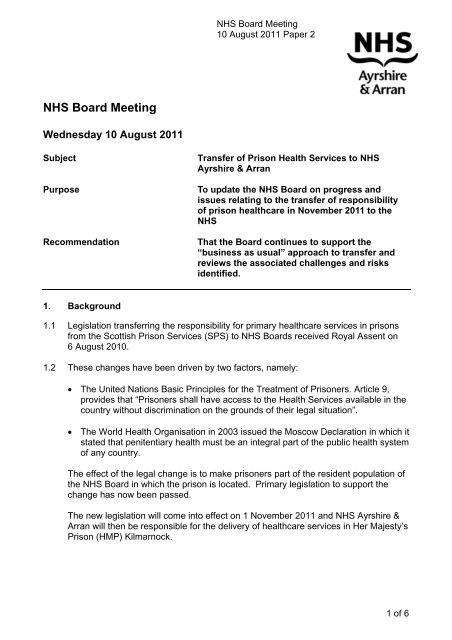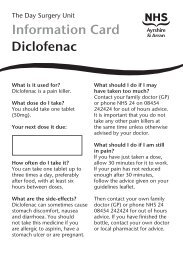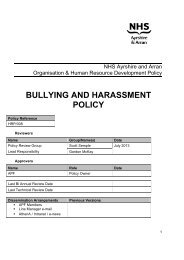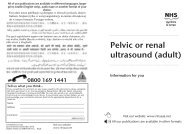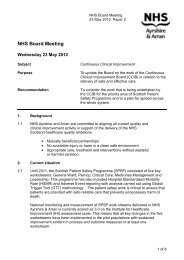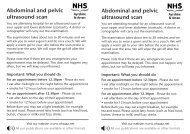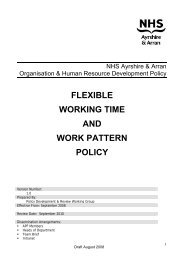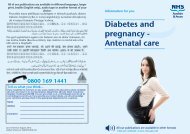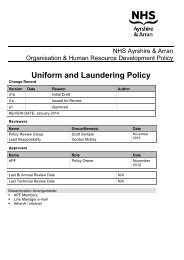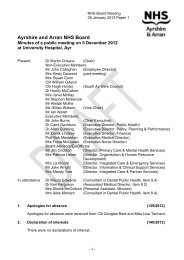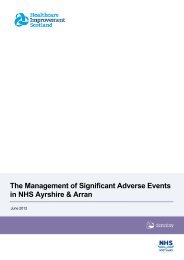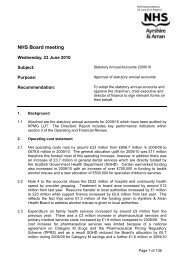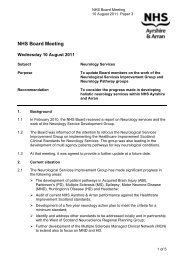Paper 02 - NHS Ayrshire and Arran.
Paper 02 - NHS Ayrshire and Arran.
Paper 02 - NHS Ayrshire and Arran.
You also want an ePaper? Increase the reach of your titles
YUMPU automatically turns print PDFs into web optimized ePapers that Google loves.
<strong>NHS</strong> Board Meeting10 August 2011 <strong>Paper</strong> 2<strong>NHS</strong> Board MeetingWednesday 10 August 2011SubjectPurposeRecommendationTransfer of Prison Health Services to <strong>NHS</strong><strong>Ayrshire</strong> & <strong>Arran</strong>To update the <strong>NHS</strong> Board on progress <strong>and</strong>issues relating to the transfer of responsibilityof prison healthcare in November 2011 to the<strong>NHS</strong>That the Board continues to support the“business as usual” approach to transfer <strong>and</strong>reviews the associated challenges <strong>and</strong> risksidentified.1. Background1.1 Legislation transferring the responsibility for primary healthcare services in prisonsfrom the Scottish Prison Services (SPS) to <strong>NHS</strong> Boards received Royal Assent on6 August 2010.1.2 These changes have been driven by two factors, namely:• The United Nations Basic Principles for the Treatment of Prisoners. Article 9,provides that “Prisoners shall have access to the Health Services available in thecountry without discrimination on the grounds of their legal situation”.• The World Health Organisation in 2003 issued the Moscow Declaration in which itstated that penitentiary health must be an integral part of the public health systemof any country.The effect of the legal change is to make prisoners part of the resident population ofthe <strong>NHS</strong> Board in which the prison is located. Primary legislation to support thechange has now been passed.The new legislation will come into effect on 1 November 2011 <strong>and</strong> <strong>NHS</strong> <strong>Ayrshire</strong> &<strong>Arran</strong> will then be responsible for the delivery of healthcare services in Her Majesty’sPrison (HMP) Kilmarnock.1 of 6
1.3 <strong>NHS</strong> <strong>Ayrshire</strong> & <strong>Arran</strong> has one prison within the board area. HMP Kilmarnock isprivately run by SERCO Home Affairs under contract from the SPS. Prison healthservices are currently sub-contracted by SERCO Home Affairs Prisons to SERCOHealth. This differs from the majority of other prisons within Scotl<strong>and</strong> whose healthservice is provided directly by SPS.HMP Kilmarnock is contracted by the Scottish Prison Service to house 598 prisoners<strong>and</strong> currently accommodates approximately 548 male adult prisoners <strong>and</strong> has thecapacity to house a maximum of 658 prisoners. The categories of prisoners currentlywithin HMP Kilmarnock are:• Rem<strong>and</strong> prisoners – prisoners who have not been granted bail while awaitingtrial• Short-term prisoners – convicted prisoners serving less than four years• Long-term prisoners - convicted prisoners serving more than four yearsYoung Offenders who are on rem<strong>and</strong> may also be held in HMP Kilmarnock.Approximately 50% are residents of <strong>NHS</strong> <strong>Ayrshire</strong> & <strong>Arran</strong> with the rest of thepopulation being from other boards.1.4 A recent health needs assessment carries out within HMP Kilmarnock found thatprisoners had a range of health issues including• 40% with drug addiction issues• 32.4% with alcohol problems• 10.6 % had hepatitis C• 15.1 % sought help with mental health issues• 16.8% had asthma• 80.6% smoke1.5 Within <strong>NHS</strong> <strong>Ayrshire</strong> & <strong>Arran</strong> planning to transfer services commenced in June 2010.A Local Implementation Group (LIG) was established with 4 workstreams mirroringnational planning as follows• Models of Care• Governance• HR• ThroughcareIn addition a further workstream has been developing IT solutions.1.6 While it is clear that the legislative changes are designed to enable the prisonerpopulation to access a full range of healthcare services the advice <strong>and</strong> guidance fromthe National Programme Board for Prisoner Healthcare has been that the thereshould be continuity of service provision through a ‘business as usual’ approach inthe first instance. This is to ensure minimal disruption to prison running <strong>and</strong> reducethe risk of prison disorder associated with the transfer.<strong>NHS</strong> <strong>Ayrshire</strong> & <strong>Arran</strong> Board agreed to support the “business as usual” approach atthe <strong>NHS</strong> <strong>Ayrshire</strong> & <strong>Arran</strong> Board Meeting on 11 th May 2011 with the followingexceptions –• Removal of the existing 14 in-patients beds to mirror the rest of the SPS prisonestate2 of 6
• An electronic records system will replace the existing paper based system1.7 Future additional investment in prisoner healthcare will take place over time utilisingthe organisations clinical prioritisation process.1.8 A detailed operational plan has been developed by the Local Implementation Group(LIG) based on the “business as usual” approach specifying how the service will bedelivered post transfer. This has been submitted to the government on 28 April 2011.2. Current situation2.1 Both general <strong>and</strong> specific feedback relating to the submission by the respectivehealth board has been received from the Scottish Government in relation the detailedoperational plan. Overall the plans have been received positively <strong>and</strong> work in now ongoingto adapt initial plans reflecting the feedback received. A revised detailedoperational plan has been submitted to the Scottish Government on the 20 th of July2011.2.2 The Local Implementation Group is now working to ensure delivery of healthcareservices as described in the operational plan by the 31 st of October 2011. Whilstprogress is being made in all areas there are a number of issues that are posingsignificant risk to the success of delivery of a full service in November 2011. Theseissues being –• The provision of Pharmacy• The provision of Out of Hours Care2.3 <strong>NHS</strong> <strong>Ayrshire</strong> & <strong>Arran</strong>’s preferred option for the provision of Pharmacy to Kilmarnockprison was to opt into the national prison pharmacy contract currently held betweenSPS <strong>and</strong> Llyod’s Pharmacy. Discussions have been taking place at a national levelas to the legality of health boards with privately run prisons opting into the existingpharmacy contract. However advice received from the Central Legal Office hasstipulated that due to tendering regulations amalgamation of privately run prisons intothe existing contract is not possible.2.4 <strong>NHS</strong> <strong>Ayrshire</strong> & <strong>Arran</strong> are now currently undergoing a procurement exercise to obtaina local contract. This procurement exercise will be carried out in conjunction with<strong>NHS</strong> Lothian who also has privately run prison Addiewell within their remit. Theprocurement exercise should be completed <strong>and</strong> a contract awarded by the end ofSeptember to allow a shadow working period during October <strong>and</strong> for full takeover tobe in place on 1 st November in line with healthcare transfer.2.5 Initially detailed operational plans included details of the provision of out of hours carefor both medical <strong>and</strong> dental emergencies. Aspects of these models are however nolonger feasible given the requirement for models to work congruently with KilmarnockPrisons operational procedures. This significantly restricts the scope for provision ofOut of Hours Care. Examples of these processes are prison lockdown taking place at10pm <strong>and</strong> the limited scope for transportation of prisoners to local emergency carefacilities.2.6 Engagement will continue with Kilmarnock Prison to ensure that a robust process isdeveloped <strong>and</strong> implemented on transfer of healthcare services for emergency careprovision.3 of 6
3. Proposal3.1 While it is clear that the legislative changes are designed to enable the prisonerpopulation to access a full range of healthcare services the advice <strong>and</strong> guidance fromthe National Programme Board for Prisoner Healthcare has been that the thereshould be continuity of service provision through a ‘business as usual’ approach inthe first instance.3.2 This is reflected in the advice being received from Scottish Government that thefinancial allocation to support the transfer of responsibility for Prison Healthcare to<strong>NHS</strong> Boards will not exceed the current level of expenditure. Work will thereforecontinue to deliver a range of services in line with that currently provided atKilmarnock Prison.3.3 Work will continue on the procurement of a Pharmacy contract in conjunction with<strong>NHS</strong> Lothian.3.4 Engagement <strong>and</strong> co-operation with Kilmarnock Prison will continue to ensure that arobust process for emergency care provision is developed <strong>and</strong> implemented ontransfer of healthcare services.4. Engagement <strong>and</strong> consultation on development of the proposal4.1 This paper is the culmination of planning processes developed by the localimplementation group whose membership includes;• <strong>NHS</strong> Primary Care• <strong>NHS</strong> Mental Health Services• Serco Health <strong>and</strong> Home Affairs• Prison Healthcare Staff• SPS Contracts <strong>and</strong> Transfer Teams• Local Authority Criminal Justice• Staff Partnership• Scottish Health CouncilDirectors have received regular updates throughout the process.5. Resource implications <strong>and</strong> identified source of funding5.1 Nationally SPS spends £20 million per annum on prison healthcare. £10.1 millionhas been transferred to <strong>NHS</strong> for the 5 months from November to March 2011/12.Agreement has been reached with directors of finance to allocate to boards for thisfinancial year on the basis of historic spends. An allocation of £1 million is to be heldby the health directorate to be used as a contingency fund that health boards canapply for assistance from should overspends be occurring.5.2 At the time of writing this report historic spend for private prisons is unknown <strong>and</strong> noformal notification of allocation has been made. It is anticipated however thatallocation for 2011/12 for <strong>NHS</strong> A&A will be in the region of £1.2 million <strong>and</strong> planninghas taken place on this basis.4 of 6
6. Risk assessment <strong>and</strong> mitigation6.1 There are a number of generic risks associated with transfer of prison healthservices;Firstly It should be noted that any real or perceived diminution of service provisioncould adversely affect order within the prison. This would be likely to jeopardiseimportant partnership arrangements with SERCO. To mitigate this risk, the principleof business as usual has been used as a basis for planning, representatives fromSERCO are involved in the current planning arrangement to ensure a smoothtransition to the new arrangements that should be imperceptible to the prisonerpopulation.The business as usual approach could be seen to be at odds with the legislationwhich entitles the prisoner population to the range of healthcare services offered bythe Health Board to its wider population. There may therefore be a risk that <strong>NHS</strong><strong>Ayrshire</strong> & <strong>Arran</strong> could be open to question <strong>and</strong> possibly litigation if a full service isnot available from 1 November 2011. To mitigate this an ongoing programme ofinvestment in prison healthcare services as funding becomes available, prioritisingthis against other cost pressures through the Clinical Resource Group.At the time of writing the allocation to <strong>NHS</strong> <strong>Ayrshire</strong> & <strong>Arran</strong> has not been finalised.There remains a risk that the financial allocation may not be as anticipated. Tomitigate this costed plans have been submitted to the national transfer group,discussions continue at national finance director meetings. Further action may beneeded to ensure delivery of service within the resource envelope if the allocation isnot as anticipated.Governance arrangements <strong>and</strong> culture across <strong>NHS</strong>, SPS <strong>and</strong> Serco health differ.There is a risk that the organisation will be open to complaint <strong>and</strong> litigation if any ofthe partners governance st<strong>and</strong>ards are breached. Local operational procedures arebeing agreed via the clinical governance group <strong>and</strong> nationally a memor<strong>and</strong>um ofunderst<strong>and</strong>ing has been agreed between <strong>NHS</strong> <strong>and</strong> SPS to mitigate this risk.Given the time constraints identified with the process of tendering for a Pharmacycontract, procurement of a contract may not be completed prior to the 31 st of October2011. If this is the case other contingency options may have to be utilised such asobtaining a short-term contract with a local provider or using <strong>NHS</strong> <strong>Ayrshire</strong> & <strong>Arran</strong>’sin-house drugs supply until the procurement exercise is completed.7. Impact assessment <strong>and</strong> consequential changes proposed to mitigate adverseimpacts identified7.1 The final arrangements for the transfer of Prison Healthcare Services at HMPKilmarnock to <strong>NHS</strong> <strong>Ayrshire</strong> & <strong>Arran</strong> will only become clear when the work of all ofthe national workstreams has been completed <strong>and</strong> these findings have beenincorporated into local plans. The plans will therefore be subject to a full impactassessment when they have been concluded.8. Conclusion8.1 The Board are invited to review the challenges, financial implications <strong>and</strong> identifiedrisks associated with this transfer.5 of 6
8.2 Board members are asked to continue to support the transfer of responsibility forprison health services using a business as usual approach, recognising the need topursue additional investment over time through the organisation’s clinical prioritisationprocess.Jim Crichton, Director of Primary Care & Mental Health Services[Natalie Marshall]18 July 20116 of 6


